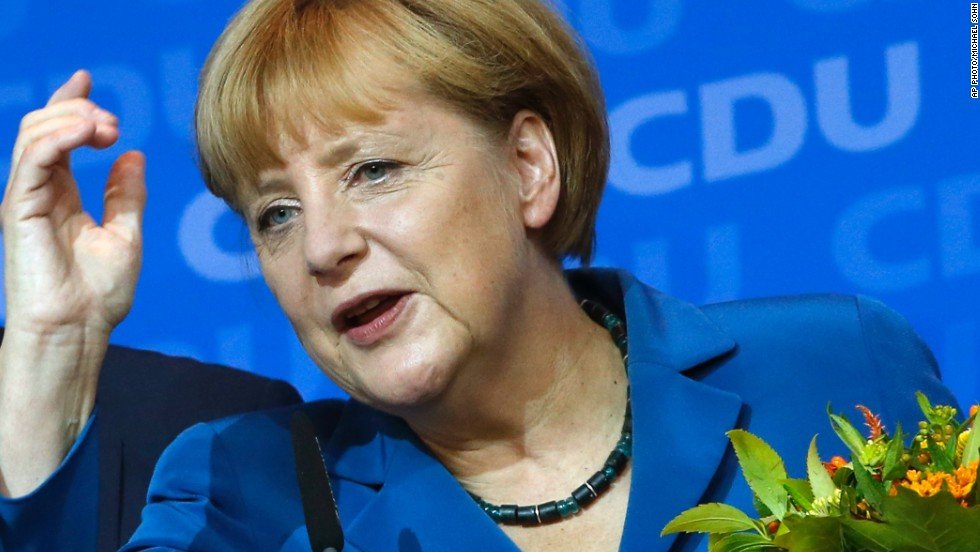Merkel's hard defeat in Germany

TEHRAN _ Finally, as expected, German Chancellor Angela Merkel failed to form a coalition government. Merkel is now facing hard times. He has to negotiate again with the Social-Democratic Party, the main rival, to escape the crisis. However, the Social Democrats have stated that they do not intend to have a coalition with Christian parties. On the other hand, Merkel may negotiate with the green party to form a minimal government. In this case, the Chancellor will have limited power in the next government. What is certain, Merkel's defeat in the formation of the Jamaica coalition represents a difficult path she will face in the future.
In recent days, the media have been seriously analyzing Merkel's failure to formulate a coalition government. As Bloomberg reported, German Chancellor Angela Merkel’s bid to form a new government failed, raising the prospect of fresh elections in Europe’s largest economy and casting doubt on the future of its longest-serving leader. A month of coalition talks collapsed in dramatic fashion just before midnight Sunday as disputes among a grab-bag of disparate parties over migration and other polices led the Free Democrats to walk out.
Merkel, whose 12 years in office have made her an anchor for the European Union in times of crisis, said she’ll stay on as acting chancellor and consult with Germany’s president later Monday on what comes next. Relying on a minority administration with shifting alliances to pass legislation over the next four years would run counter to her promise to provide a stable government.
“It’s a day at the very least for a profound examination of Germany’s future,” Merkel, 63, told reporters in Berlin. “As chancellor, as caretaker chancellor, I will do everything to make sure this country continues to be well governed through the tough weeks ahead.”
Merkel can now ask President Frank-Walter Steinmeier to order what would be the second national election since September, most likely in the spring, or form a minority government headed by her Christian Democratic-led bloc. Both scenarios would push a country that’s had just eight leaders since World War II into uncharted territory.
“Europe has lost another illusion: Germany is no longer the role model of political stability,” said Carsten Brzeski, chief economist at ING-Bank AG.
Merkel has already put Germany’s euro policy on hold until a new government is formed. The common currency weakened as much as 0.6 percent, the most in three weeks, before rebounding against the dollar. The DAX index of German stocks pared losses after touching a seven-week low.
“A chance has been missed to go beyond ideological boundaries and agree realistic solutions,” Eric Schweitzer, head of Germany’s DIHK chamber of industry and commerce, told the Deutsche Presse-Agentur newswire. “But the DIHK is confident that all responsible parties will ultimately be capable of finding sensible compromises.”
Merkel’s biggest setback since she first won the chancellorship in 2005 follows unusually contentious exploratory talks. Policy disagreements on immigration, climate and energy proved so entrenched that even Merkel, once dubbed “the queen of the backrooms,” couldn’t bridge them.
Free Democratic Party officials in Germany have been identified as the main factors behind the failure of coalition talks. In other words, the Free Democratic Party in Germany prevented the formation of a Jamaican coalition between the four Christian Democrats, Christian Socialists, Green and Democrats.
As Bloomberg reported, FDP Chairman Christian Lindner said the draft agreement to enter into formal coalition talks was riddled with “countless contradictions.” Lindner has called for a “turnaround” plan for Germany’s economy that includes larger cuts in income taxes and more business-friendly measures. The FDP also wants to allow countries to leave the euro in an orderly way without quitting the EU.
“On the big questions, there were no concessions” from the other parties, Nicola Beer, Free Democrat general secretary, said on ZDF television. “The topic was: is the overall direction right, do we have a common vision of what kind of policy should be done in this country over the next four years?”
Also New York Times reported that Failure to reach an agreement could have wide-ranging implications for Germany, the European Union and beyond. Ms. Merkel could still try to approach the Social Democrats, her governing partners since 2013, but they suffered losses in the vote and have vowed to take time out in the opposition to regroup.
Failure to find any partners to form a government would mean President Frank-Walter Steinmeier would most likely nominate Ms. Merkel as chancellor, given that her party has the largest bloc in Parliament. If lawmakers voted to confirm her nomination, she would have to choose between leading a minority government — novel in Germany’s post-World War II history — or dissolving Parliament, which would lead to new elections within two months.
Ms. Merkel and her center-right Christian Democrats were weakened in the Sept. 24 elections and found themselves without a clear path to forming a new government after winning only 30.2 percent of the vote. The emergence of the far-right Alternative for Germany, or AfD, as the third-largest force in Parliament upset a balance of power that had dominated since the 1950s, in which one of the two centrist parties has traditionally had enough seats to form a coalition with a smaller party.
Finally, Angela Merkel has accepted a tough defeat in Germany. Anything that happens in the future will weaken the power of the German Chancellor. It should not be forgotten that some of Merkel's party members also disagreed with the Chancellor in Germany, but she eventually decided to stay in that position for the fourth time.

Leave a Comment